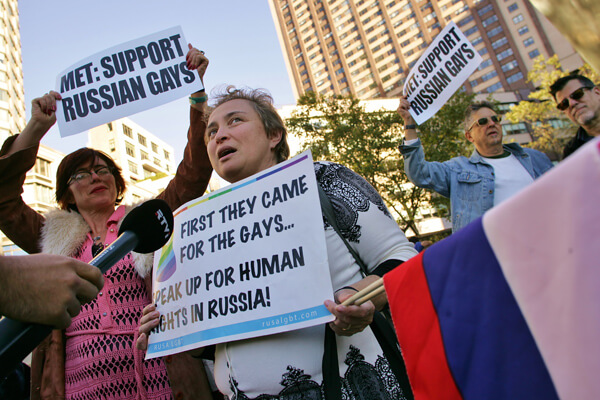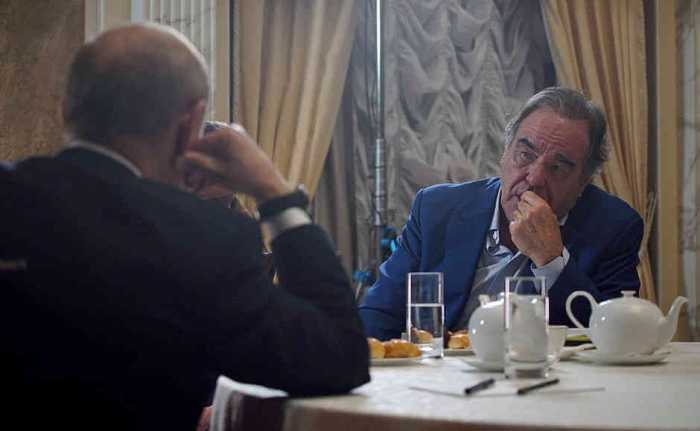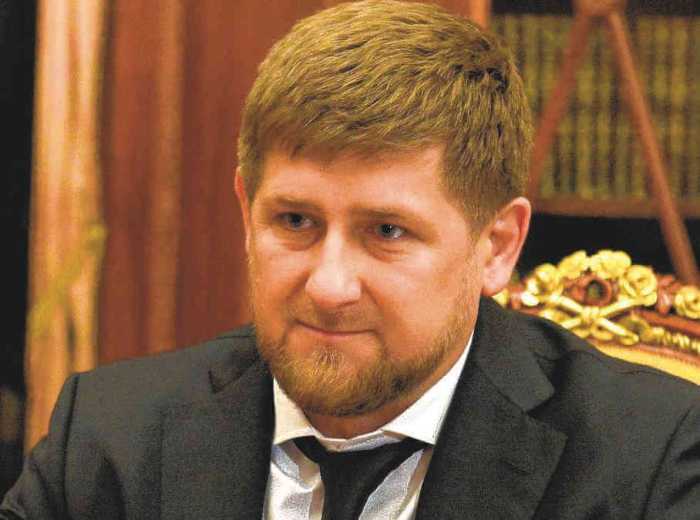Protesters lined up outside the Met's gala performance at Lincoln Center on September 23. | SAM SPOKONY
Around 50 LGBT activists protested outside the Metropolitan Opera on the evening of September 23 as the Met opened its 2013-2014 season with a gala performance featuring two longtime supporters of Russian President Vladimir Putin.
Protesters led by Queer Nation, a New York-based direct action group, and RUSA LGBT, a Russian-speaking civil rights group based in the US, shouted “Shame on the Met!” and “Support Russian gays!” as affluent theatergoers stepped out of limos in front of the famous Lincoln Center opera house, many dressed in tuxedos and bubbling with excitement to attend the performance of Peter Tchaikovsky's 1879 opera “Eugene Onegin.”
This production of “Eugene Onegin,” which will run until December, features the renowned Russian diva Anna Netrebko, who sings the female lead and who has figured prominently in the Met's promotion of the show among opera fans. The orchestra is conducted by another Russian, Valery Gergiev, who currently serves as general director of the historic Mariinsky Theatre in Saint Petersburg.
Both Netrebko and Gergiev are publicly ardent supporters of Putin, whose government, in June, enacted a draconian law that effectively bans any pro-LGBT statements or demonstrations in public, in private, or on the Internet.
“I think [Netrebko and Gergiev] have made a devil's bargain, one that they didn't fully understand, when they chose to become cheerleaders for Putin,” said openly gay composer Andrew Rudin, who also helped to organize the protest and whose concertos have been performed in the past at other Lincoln Center venues. “There are very notable artists whose careers were forever tarnished because of what they did, or didn't do, during World War II, and that may be the same path they're headed down.”
In addition to Netrebko and Gergiev, the protest was also focused squarely on Peter Gelb, the Met's general manager.
Rudin circulated a petition, signed by roughly 10,000 people, calling on the Met to dedicate the performance to LGBT people around the world, but Gelb refused to do that.
Instead, Gelb wrote a preemptive op-ed for Bloomberg News on September 22, a day before the gala, which was published with the provocative title, “Why Met Won't Bow to Protest of Anti-Gay Law.”
“As an arts institution, the Met is not the appropriate vehicle for waging nightly battles against the social injustices of the world,” Gelb wrote in the op-ed, while adding that he “personally deplores” Russia's anti-gay laws and that the Met is “engaged [in] social advocacy” by employing an “LGBT rainbow” of artists and staff members.
“The Met is proud to present Russia’s great gay composer [Tchaikovsky],” Gelb also wrote. “That is a message, in itself.”
RUSA LGBT's Yelena Goltsman at the Lincoln Center protest. | SAM SPOKONY
But Yelena Goltsman, the founder and co-president of RUSA LGBT, explained that she thought the inherently passive message simply wasn't worth very much, given the extreme suffering of gay people currently living in Russia.
“When people pressure you to take action, you can always choose to take the easier way out and say, 'Yes, but…' and that's really all that [Gelb] did in this case,” said Goltsman. “And that's not acceptable.”
In his Bloomberg News op-ed, Gelb also justified his decision by writing that, throughout its 129-year history, the Met has “never dedicated a single performance to a political or social cause, no matter how important or just.”
But Rabbi Sharon Kleinbaum, who leads Congregation Beit Simchat Torah, New York City's LGBT synagogue, sent Gelb a letter on the day of the performance reminding him, in a subtly ironic tone, that some former general managers of the Met did, in fact, actively utilize the opera company’s status to promote positive social change.
“In your acknowledgement of the brutal tyranny transpiring today in Russia, you follow in the footsteps of your predecessors Rudolf Bing — who brought Marian Anderson and other great black artists to the Met stage in 1955 and who set a policy of non-segregation of Met performances in 1961, three years before the Civil Rights Act of 1964, and Bruce Crawford — who welcomed ‘The Best of the Best: A Show of Concern,’ to benefit AIDS research and care, to the stage of the Met in 1985,” Kleinbaum wrote.
Meanwhile, concern for the suffering of Russia's gay citizens didn't seem to weigh very heavily on the minds of those who purchased tickets for the gala performance as well as those who were invited as special guests of the Met. During the protest, Goltsman snuck past security into a Lincoln Center parking lot behind the Met's main entrance. Accompanied only by this reporter, she brought pro-LGBT fliers and signs down to the parking lot's special unmarked door, which, she had learned, special guests and those close to the Met use as a private entrance on performance nights.
Goltsman, who held a Russian flag and rainbow flag together in one hand, stood there for 15 minutes while offering fliers to around a dozen well-dressed older couples who entered that door. She was brushed off each time.
One of those theatergoers apparently chose instead to report Goltsman to security, after which a guard approached and told her and the reporter to leave the premises.





































